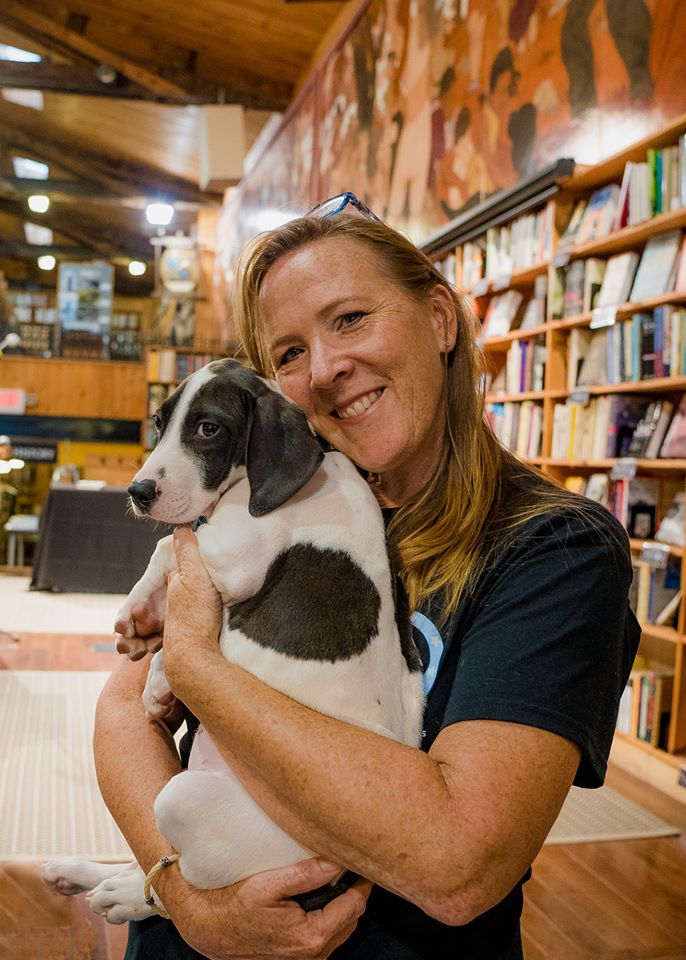When we arrived at our first stop in Kentucky was at the Daviess County Animal Shelter, a group of middle school students was gathered in the parking lot waiting to tour the shelter. This was the first clue that this public open-intake shelter is something special.
DCAS handles about three thousand animals a year. That intake number has, more or less, held steady, but the number of animals they euthanize has gone down significantly since their current director, Ashley took over 14 years ago. Ashley is a humble and transparent leader who clearly values the work her volunteers do and the people they are.


Beverly, a volunteer who has been there as long as Ashley, told me that Ashley will do everything they do – scrape poop, fold towels, whatever it takes. There is a solid group of at least fifteen regular volunteers, many of whom we met as they walked dogs and held them for pictures.
Deborah, a dog whisperer according to Ashley, volunteers six and a half hours a day three or four days a week. She walks dogs, but she also cleans up poop, does dog and cat testing, and “pretty much anything they need.”
There were two Kristi’s. One who is a relatively new volunteer with a background in nonprofit organizations. She’s eager to help expand the shelter’s community engagement –something critical to the success of any shelter.
The other Kristi, grew teary as she told me how volunteering at the shelter changed her life. She began volunteering as a way to deal with the grief following the death of a friend. Now she spends both her days off at the shelter. She imagines she will volunteer at the shelter for the rest of her life. “The animals fill me up with so much love- I didn’t realize it would work that way. They give me so much.”






In the sunny, spacious backyard of the shelter, Nancy snapped photos as I chatted with the volunteers. All of them clearly loved helping at the shelter. Thanks to the commitment of so many, the dogs thrived with all this attention. We met dozens of beautiful, sweet, well-mannered dogs. They were happy and less stressed than typical shelter dogs.










Before we left, Ashley printed out the records of intake and outcomes at the shelter going back to 1989. The numbers are hard to look at – so many animals were euthanized. But those numbers take a nose dive, going down by 50% the year Ashley began work at the shelter and going down 80% the next year, and staying that low until they began ticking back up slightly in 2019.
The shelter used to send lots of dogs out through regular transports, but like pretty much everywhere we stopped on our trip, we head that rescues were full or closing down. “You know it’s bad when you can’t even find rescue for puppies,” Ashley said. Until recently, she could count on rescues to pull puppies, but not anymore.
Ashley was frank about the fact that DCAS does still euthanize for space, but you can tell that those numbers drive her. The veterinarian added to the staff, the new spay/neuter clinic recently opened on site, the new lobby, the volunteer program, everything she does is evidence of her commitment to solving this crisis in Owensboro. There are too many unwanted animals and the shelter is more than full with animals doubled up in kennels. When we visited they had 76 dogs and 81 cats.





The pandemic briefly emptied the shelter in 2020, but it wasn’t long until they were full again and forced to euthanize 6% of the dogs in 2021. This year their numbers are already at 10%. Ashley hopes the clinic will help turn the tide and finally bring their numbers under control.
The shelter has a vet on staff and in July opened an onsite spay/neuter clinic. Dr. Julie Gray performs about 20 surgeries four or five days a week. She worked in private practice for fourteen years before starting in shelter medicine. We watched as she cradled a cat waking up from its surgery and explained that she’d found her passion in shelter medicine.


DCAS may be struggling now, but I predict that it won’t be long before they are able to save every adoptable animal and become a thriving community resource in Owensboro. Nancy and I talk a lot about what it takes to ‘save’ a shelter and we’re convinced it comes down to three things – good leadership, community engagement, and access to spay/neuter.
DCAS has all those elements in place, so now it’s simply a matter of time. I’m excited about the possibilities here in this farming community. I predict DCAS will become a flagship shelter for Kentucky, setting a shining example of how we solve our crisis of too many unwanted animals suffering and dying.
If you’d like to support their work, look them up on Facebook, shop their Amazon wishlist (https://www.amazon.com/hz/wishlist/ls/WCXIOTKNP580/), or make a donation through their website (https://www.daviessky.org/departments/animal-control/).
And if you’d like to support us – you can purchase our annual calendar ($25, free shipping). It features beautiful pictures of some of the incredible dogs we’ve met on our shelter tours this year. To order yours, email: info@whowillletthedogsout.org or message us on Facebook.




Until each one has a home,
Cara
If you want to learn more, be sure to subscribe to this blog. And help us spread the word by sharing this post with others. Visit our website to learn more.
You can also help raise awareness by following/commenting/sharing us on Facebook, Instagram, YouTube, and Tik Tok!
Learn more about what is happening in our southern shelters and rescues in the book, One Hundred Dogs & Counting: One Woman, Ten Thousand Miles, and a Journey Into the Heart of Shelters and Rescues (Pegasus Books, 2020). It’s the story of a challenging foster dog who inspired me to travel south to find out where all the dogs were coming from. It tells the story of how Who Will Let the Dogs Out began. Find it anywhere books are sold. A portion of the proceeds of every book sold go to help unwanted animals in the south.

For more information on any of our projects, to talk about rescue in your neck of the woods, or become a WWLDO volunteer, please email whowillletthedogsout@gmail.com or carasueachterberg@gmail.com.



Leave a Comment
Sign up for our newsletter
Sign up to have our latest news, grant updates, shelter visits, and more delivered to your inbox.
Share this:
Like this: